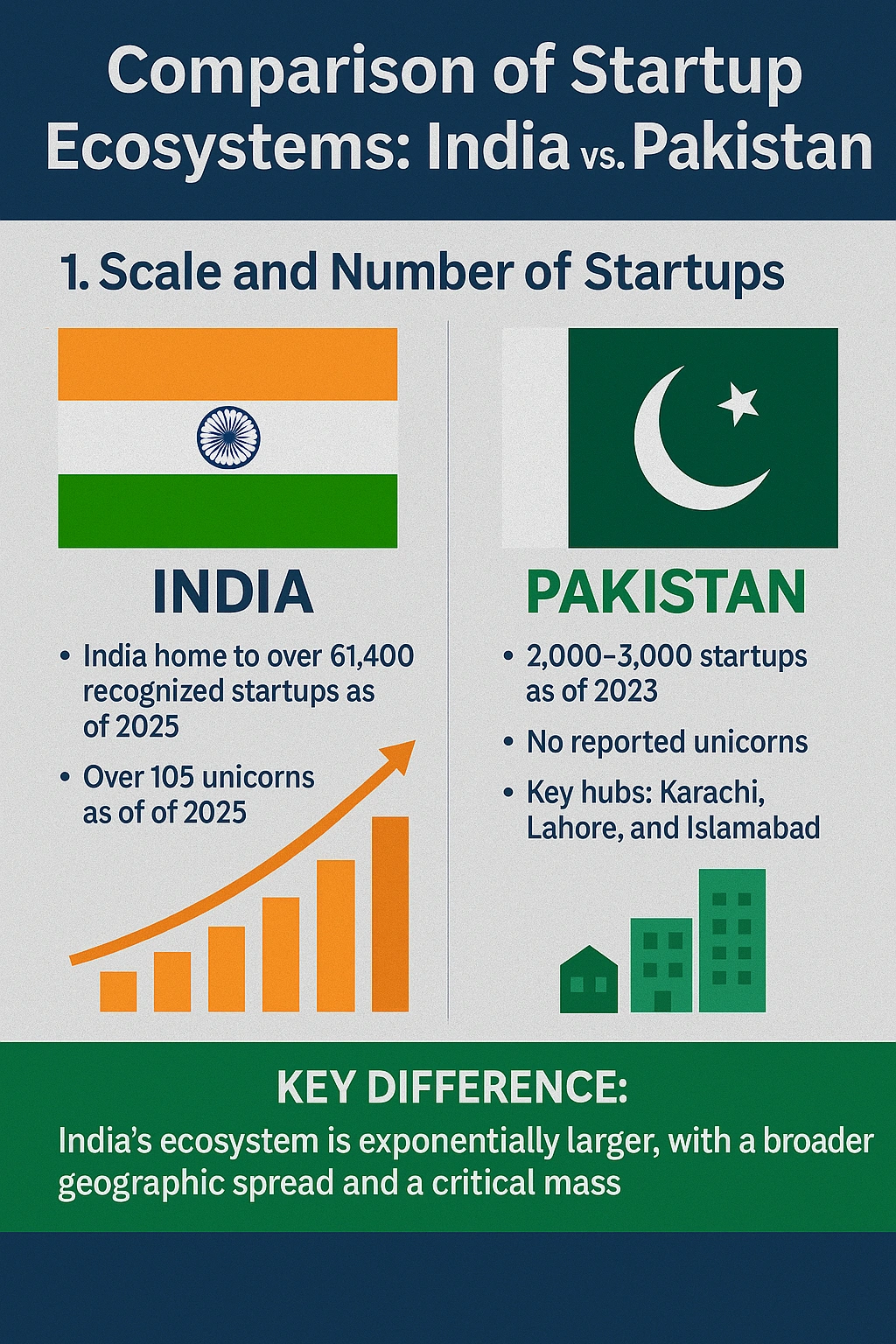The startup ecosystems in India and Pakistan are shaping the future of South Asia’s economies, but their trajectories couldn’t be more different. India’s vibrant ecosystem, with over 61,400 startups and 105 unicorns, is a global powerhouse, while Pakistan’s nascent scene, with 2,000–3,000 startups, shows promise but faces challenges. This article explores their scale, funding, innovation, revenue contributions, and why India is the clear leader in the startup race.
India’s Startup Ecosystem: A Global Leader
India boasts the third-largest startup ecosystem worldwide, trailing only the U.S. and China. With over 61,400 startups and projections of 100,000 by 2026, India’s entrepreneurial spirit is unmatched. The country is home to 105 unicorns, valued at $277.77 billion, and major hubs like Bangalore, Delhi NCR, and Mumbai drive 65% of startup activity.
Key Stats:
- $161 billion in venture capital (VC) funding since 2014
- $12 billion raised in 2024, with $2.5 billion in Q1 FY25
- 3,600 deep-tech startups, with $1.6 billion raised in 2024
- 1.6–1.7 lakh jobs created annually
Government initiatives like Startup India and the Rs 10,000-crore Deep Tech Fund have fueled growth, while Digital Public Infrastructure (DPI) like UPI and Aadhaar enables scalable innovation. From fintech giants like Paytm to AI-driven startups, India’s ecosystem is diversifying into high-impact sectors.
Pakistan’s Startup Ecosystem: Potential Amid Challenges
Pakistan’s startup ecosystem is smaller, with an estimated 2,000–3,000 startups concentrated in Karachi, Lahore, and Islamabad. While the ecosystem has grown—30% more tech hubs emerged between 2016 and 2018—it lacks the scale and maturity of India’s. Pakistan has no unicorns, and funding remains a major bottleneck.
Key Stats:
- $1 billion in VC funding since 2015
- $75.6 million raised in 2023, under $200,000 in Q1 2025
- E-commerce and fintech dominate, with limited deep-tech focus
- Thousands of jobs created, far fewer than India
Initiatives like Ignite and the National Incubation Center (NIC) provide some support, but political instability and a lack of domestic venture capital hinder progress. Startups like Daraz and EasyPay show potential, but replicating consumer-driven models limits global competitiveness.
Revenue Contribution: India’s Dominance
India’s startups significantly impact its $3.57 trillion GDP. With unicorns valued at $277.77 billion, the ecosystem contributes an estimated $50–100 billion annually (1.4–2.8% of GDP) in direct revenue, plus indirect contributions through the services sector (over 50% of GDP). Major players like Flipkart ($7.6 billion in FY23 revenue) exemplify this impact.
In contrast, Pakistan’s startups contribute a modest $500 million–$1 billion (0.15–0.3% of its $338 billion GDP). The smaller scale and lack of high-revenue unicorns limit economic impact, though e-commerce platforms like Daraz drive some growth.
Why India Wins the Startup Race
India’s dominance in the startup landscape is clear for several reasons:
- Scale and Diversity: Over 61,400 startups across sectors like fintech, AI, and healthtech dwarf Pakistan’s 2,000–3,000.
- Funding Powerhouse: $161 billion in VC since 2014 vs. Pakistan’s $1 billion.
- Government Support: Startup India, tax exemptions, and R&D funding contrast with Pakistan’s fragmented policies.
- Innovation Edge: India’s deep-tech focus and DPI-driven solutions outpace Pakistan’s consumer-driven models.
- Talent Pool: 7 million graduates and 5 lakh R&D personnel give India a significant advantage.
Opportunities for Growth
India
To maintain its lead, India must address gaps in deep-tech funding, streamline IP creation, and support startups in Tier-2 and Tier-3 cities. The IndiaAI Mission and National Deep Tech Startup Policy are steps in the right direction.
Pakistan
Pakistan can unlock its potential by:
- Emulating India’s Startup India model with tax incentives and incubators
- Developing domestic venture capital and investor-friendly laws
- Investing in STEM education and deep-tech R&D
- Leveraging CPEC for funding and market access
Conclusion: India Leads
India’s startup ecosystem is a global force, driving innovation, jobs, and economic growth. Its $50–100 billion revenue contribution and 105 unicorns cement its leadership. Pakistan’s ecosystem, contributes under $1 billion and faces structural hurdles. With reforms, Pakistan could emerge as a regional player, but for now, India is the undisputed winner.

